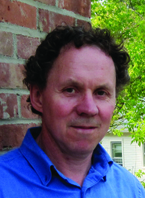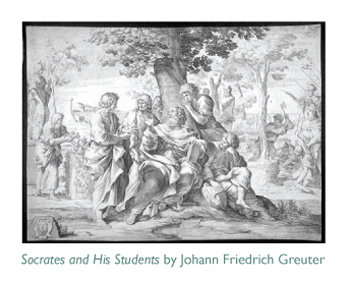Will the Great Corrupters Please Rise
 What is a philosopher? What is a scientist? What is a teacher? What is a poet? When we set about answering such questions in a way that takes us beyond dictionary definitions, we usually find ourselves trying to describe some ideal. By “poet” we really mean “good poet,” “true poet,” or even “great poet.” The accounts we give typically set aside the fact that there are bad poets, incompetent scientists, tedious teachers, and pretentious philosophers.
What is a philosopher? What is a scientist? What is a teacher? What is a poet? When we set about answering such questions in a way that takes us beyond dictionary definitions, we usually find ourselves trying to describe some ideal. By “poet” we really mean “good poet,” “true poet,” or even “great poet.” The accounts we give typically set aside the fact that there are bad poets, incompetent scientists, tedious teachers, and pretentious philosophers.
But even if we focus on the ideal, our description of “the philosopher” is still likely to be tendentiously narrow, for there is more than one ideal. There is Marcus Aurelius, the stoically calm soul who grasps the smallness of human affairs when viewed in the context of the universe and eternity; Voltaire, the shrewd sage who, though not an original thinker, memorably participates in the great debates of his time; and Siddhartha Gautama, the Buddha, who meditates until he is satisfied that he has achieved an ineffable form of enlightenment.
There are individuals of prodigious learning, like Averroes or Thomas Aquinas, who construct theoretical systems that synthesize diverse fields of human activity and learning; intellectuals like John Locke, who clarify conceptual issues in the service of science; subtle analysts like J. L. Austin, who enjoy distinguishing between various senses of the word “if”; and pompous purveyors of profundity (even Heidegger’s best friends would’ve had to concede that he was pompous) who plumb the depths of Being using esoteric locutions.
In different times and places different ideals of the philosopher have gained ascendency. But within Western philosophy, at least, one particular ideal has become especially important since the advent of modernity. This is the ideal represented by Socrates, our patron saint and first martyr. According to this ideal, a philosopher is someone who corrupts the youth. Corrupting the youth was, of course, one of the crimes of which Socrates was found guilty by an Athenian court in 399 BCE. The jury doubtless had in mind the fact that some of Socrates’ young friends had turned out rather badly. They may also have been influenced by the memory of The Clouds, Aristophanes’ play in which a young man who studies under Socrates eventually beats up his own father.
 In the opinion of Socrates’ friends, notably Plato, his greatest disciple, the accusation was outrageous: Socrates was the finest man they knew. But there was substance to the charge. Indeed, the reason the Athenians viewed Socrates as a dubious character was precisely what made him, in Nietzsche’s words, “a turning point in world history.”
In the opinion of Socrates’ friends, notably Plato, his greatest disciple, the accusation was outrageous: Socrates was the finest man they knew. But there was substance to the charge. Indeed, the reason the Athenians viewed Socrates as a dubious character was precisely what made him, in Nietzsche’s words, “a turning point in world history.”
In every human society people hold beliefs and perform actions. So they must come by these beliefs in some way, and they must have some way of deciding how to act. For most people throughout history these processes are neither long nor complex, nor conscious. There are authorities that lay down what is true and what is right.
The most powerful and ubiquitous of these authorities is tradition—what anthropologist William Sumner called the “folkways,” whereby people simply think and act as their forbears did. Any departure from these patterns is viewed with suspicion; often it will be condemned as immoral. So where tradition dictates that the dead should be buried, cremation will seem disrespectful. Where the convention is that men wear trousers, a man who shows up to work in a dress may lose his job.
Other epistemic and moral authorities include scriptures, esteemed literary and philosophical texts, myths and legends, political rulers, priests, mystics, elders, oracles, scholars, teachers, and I suppose, in one or two rare instances, parents.
A philosopher who carries on the work of Socrates is one who refuses to defer unthinkingly to any of these authorities. Why should I believe this? one asks. Why should I do that? What do you mean by that term? Where is your evidence? What is your argument? Socrates’ greatest legacy is to tell us that such questions are always in order.
But to those who endorse the established ways of thinking, such questions easily appear disrespectful or even dangerous. If you doubt this, imagine the outcry should one of our politicians suddenly wax Socratic in the middle of a presidential debate:
“You talk about freedom. But what does the word mean? I’m sure I don’t know, and I’m not convinced anyone else does either!”
“The family? Can we be certain that this is the best social unit for raising children? What’s the evidence? Why not experiment with alternative arrangements?”
“Perhaps our obsession with private property is a mistake. Why do we think the right of one person to keep everyone else off their land is more important than the right of everyone else to enjoy that land?”
In the eyes of the majority, merely asking such questions would prove one unfit for office. For the questions threaten elements in the framework of beliefs and values that go by the names of Truth, Justice, and the American Way. To have faith in these elements is to be sound, trustworthy, patriotic, virtuous, and decent. To undermine such faith by demanding that traditional beliefs justify themselves is to be a bad influence—in short, a corrupter. Of whom? Naturally, of those whose faith has not yet been permanently etched into them—that is to say, the youth.
The Socratic philosopher embodies the critical spirit, and that is one way he or she corrupts the youth: by teaching them to think for themselves. In world-historical terms too, philosophy has helped destroy humanity’s trust in the hallowed verities handed down by previous generations. When René Descartes, writing in 1638, championed the scientific outlook by praising those who use their own reason rather than putting their faith in old books, he was continuing Socrates’ work. The astonishing achievements of modern science are the fruits of this attitude.
But there is a further, more subtle way that Socratic philosophy corrupts. By demanding that we justify our claims, it forces us to become self-conscious about our own framework of beliefs and values in the act of subjecting these to criticism. We also become aware of how these change over time. The philosopher is thus an instrument through which, as Hegel put it, a time apprehends itself in thought. And this, too, is a form of corruption because, as Adam and Eve discovered in Genesis, self-consciousness is opposed to innocence. We find young children so endearing, after all, just because they lack self-consciousness, because they are “innocent.”
Philosophy thus aims to corrupt the youth—that is, those whose thinking is still flexible—by challenging authority and fostering self-awareness. Of course, we philosophers don’t usually describe our activity in quite these terms, especially when applying for grants or trying to avoid budgetary axes. But insofar as we seek to be worthy heirs to Socrates, this remains one of our primary and most honorable goals.
